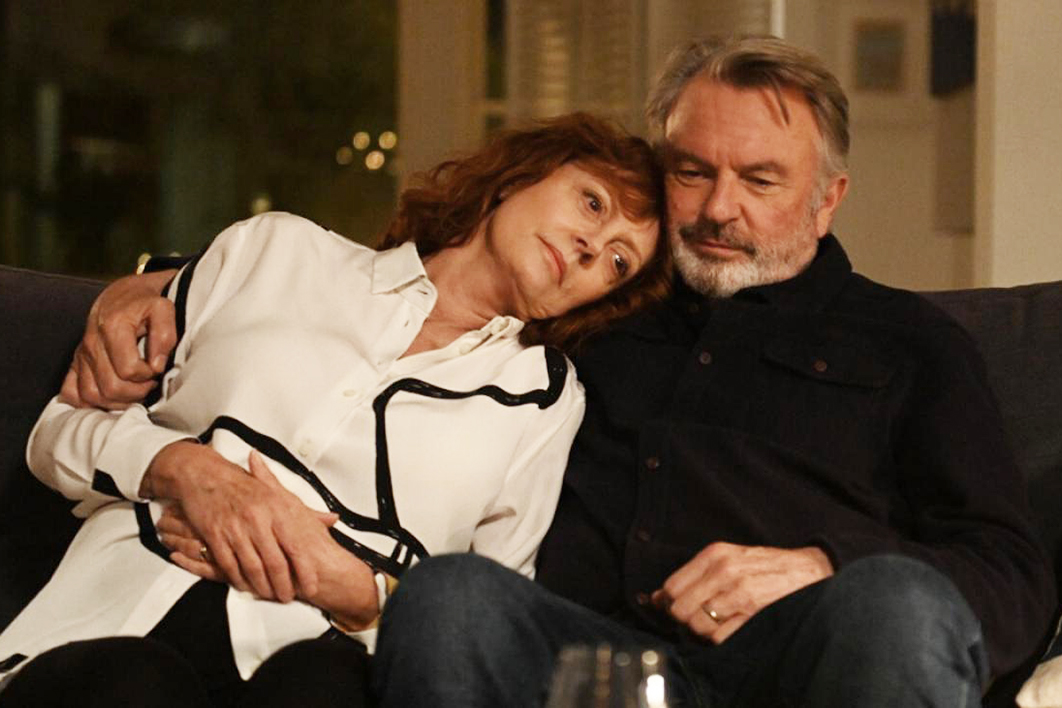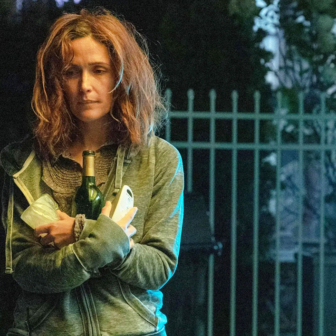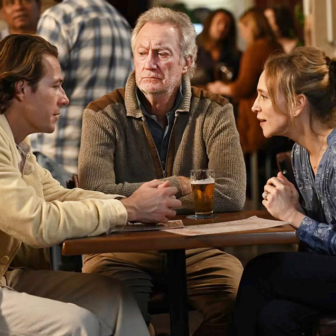To come clean at the outset on two matters: I have no idea what the title Blackbird refers to; and I have never seen the 2014 Danish film Silent Heart of which the new film is a remake. The odd bird might fly by in British director Roger Michell’s film, but none seems to have made an impact on this viewer or the narrative. If it’s a reference to the ancient song, “Bye Bye Blackbird,” then it is not a very subtle allusion in a film about a planned death. As to the Danish film, it seems not to have been released in Australia, but the new film appears to parallel its narrative trajectory. And, by bizarre — and trivial – coincidence, both films have exactly the same running time.
There is a long history of films based on reunions of families and friends that become fraught with tensions, unforeseen or not, and several recent releases have offered new evidence for its sturdiness as a plot device and structure. Two that come to mind are the Australian Palm Beach (2019) and the superb Chinese-American co-production, The Farewell (2019). The former has the compelling presence of Sam Neill in common with Blackbird, while the latter foreshadows Blackbird by also involving an imminent death.
Enough about context for the moment. Michell’s film, with a screenplay by Christian Torpe (who also wrote Silent Heart), opens on a beautiful but somewhat gloomy vista of uncertain sky. Paul (played by Neill) emerges from a handsome house by a Connecticut beach (actually filmed in Wessex) to pick tomatoes; back inside his wife Lily (Susan Sarandon) is having difficulty dressing. Once downstairs, though, she responds to dance music and engages Paul to join her in what seems a moment of carefree pleasure. She is suffering from a degenerative disease and, with Paul’s cooperation (he is a doctor), she is planning to suicide after a last weekend visit from her daughters, their partners, a grandson and her oldest friend.
Daughter Jennifer (Kate Winslet) arrives first, with her husband Michael (Rainn Wilson) and teenage son Jonathan (Anson Boon), and there is initially some tension between her and Lily, as there is between Jennifer and her sister Anna (Mia Wasikowska), who has come with her off-and-on partner Chris (Bex Taylor-Klaus). The weekend party and, indeed, the whole cast is completed by the arrival of Lily’s best friend since college days, Liz (Lindsay Duncan), who is, as far as we know, on her own, and has a sharp tongue. (She refers to Jennifer’s husband as Mr Dull, and he confirms her aptness by insisting on talking about the crossword clues he’s having trouble with.)
With the cast coming and going, Blackbird feels a bit like a stage play. Each character has his or her moments, usually with Lily; all have come together at Lily’s request for a family meal and a faux-Christmas celebration, complete with tree, decorations and a massive dinner. There are some moments of harmonious enjoyment — post-dinner charades, or during breakfast when Lily calls “Bacon!” from the top of the table — but the serious element must persist. Paul spends much time trying to explain to the visitors the moral issues involved in the still-illegal practice of euthanasia, which he and Lily have in mind for Monday.
This is a demanding scenario for the viewer, as well as for Lily’s family, especially as fraught elements from the past make themselves felt. The relationship between the two daughters, and theirs with Lily — who has perhaps not been the easiest mother — are an example. Firm-minded Jennifer (Winslet in a superbly nuanced performance of middle-aged compliance with family and life in general) cautions the less-together Anna to “make more of an effort for the family.” And Jonathan, Jennifer’s son, has just the right sense of awkwardness that diminishes as Lily asks him, with real interest, about his plans for the future. To his parents’ surprise, he says he wants to be an actor.
There is a lot of talk about dying, about what is legal and what is not, about how far Lily has a right to her own decision, with the daughters announcing to the family that they can’t go along with her plan, despite Jennifer having previously insisted that “this is Mum’s decision.” Much of the film’s dialectic makes for compelling viewing — and listening — and much of the credit for this goes, under Michell’s direction, to Mike Eley’s eloquent cinematography. Eley captures much of the drama in close-ups that subtly reveal the state of mind of the various family members, contrasting these with wide shots that create the sense of the family as a whole, sometimes in the harmony of the meal table, sometimes in dissonance.
Michell has often displayed rigour and sensitivity in dealing with unexpected and/or troubled relationships, whether for comedy as in Notting Hill (1999) or to more sombre effect in Enduring Love (2004) and Le-Weekend (2013). In his latest film, working from Trope’s perceptive screenplay, he has a uniformly adept cast to bring this to life. Susan Sarandon’s Lily is a potent study in courage, ego, joy and pain, and everyone else has — and makes the most of — moments that reveal what matters most beneath whatever the surface requirements of those moments.
Above all, I want to draw attention to Sam Neill’s performance as Paul. He may have less to say than the others, but in a curious way it is he who provides the film’s framework. Observing and listening when not actually organising events, he becomes the presence through whose eyes we often view and assess what is going on.
Neill, a New Zealander, was one of those actors who came to prominence in the Australian film revival of the 1970s, along with Bryan Brown, Mel Gibson and Jack Thompson, all of whom went on to international successes. Arguably, though, his filmography has covered a wider range that shows no signs of abating. Consider what his four latest Australian roles have offered: as the kind-hearted preacher Fred Smith in the “western” Sweet Country (2017), as jockey Michelle Payne’s patient father in Ride Like a Girl (2019), as the courteous Leo with his own secrets in Palm Beach (2019) and as Colin, the decent brother, in Rams (2021).
In all of these, and many others, Neill is an imposing presence, conveying a good deal without seeming to be doing much. Now well into his seventies, may he continue to do so, and his work in Blackbird suggests that he will.
Blackbird, as its starting-point might suggest, is an occasionally harrowing experience, but one that is well worth having. •




